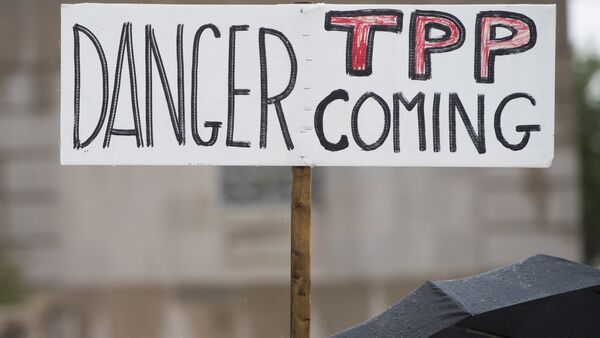WASHINGTON (Sputnik) — TPP talks in Atlanta between trade ministers from a dozen countries were extended until Saturday as officials seek to smooth out the remaining issues preventing the hotly-contested agreement from ratification.
"What really happens in these [TPP] negotiations is not a collective sense of free trade, but a self-interested sense of managed trade, where each country is taking a rather mercantilist position sector by sector," Bhala, who is also a University of Kansas Law Professor, said on Thursday.
Bhala explained that US negotiators have been demanding that Canada open up its dairy sector to American producers while, at the same time, refusing TPP partner pleas to access US sugar markets.
In other words, Bhala noted, Canadian dairy producers would be foregoing $2 billion dollars in revenue on an annual basis that would flow into the coffers of companies primarily based in the United States and New Zealand.
On the other hand, he added, Washington has resisted Australian demands for greater market access to sugar, the same way the Canadians have been resisting American and New Zealand demands.
The former UN delegate observed what is interesting about the agricultural as well as industrial sector controversies between TPP partners is how these older industries are blocking a purported new age trade agreement.
"The USTR [US Trade Representative] has touted TPP as a 21st Century agreement, but the key issues are really 19th and 20th century," Bhala suggested. "Some of the biggest stumbling blocks are dairy and auto parts, which are very 20th century issues."
The cognitive dissonance over the trade terms within the agricultural and industrial industries are not the only issues that have helped stall TPP negotiations.
Other contentious issues, Bhala claimed, will include battles over intellectual property, government procurement, human rights, currency manipulation and dispute settlement, to name just a few. Not to mention the secretive nature of the TPP trade discussions themselves.
"It’s [TPP] just about the most non-transparent agreement we’ve ever seen in the United States," Bhala claimed.
TPP is a controversial trade deal between 12 pacific countries, including the United States, Australia and Canada, with a stated goal of promoting regional growth and economic integration.






